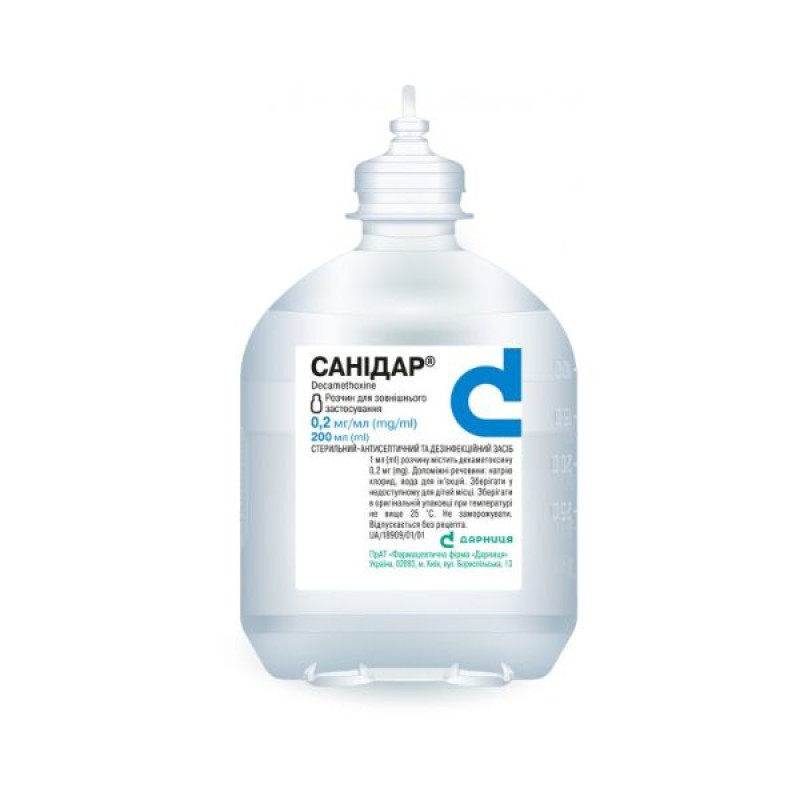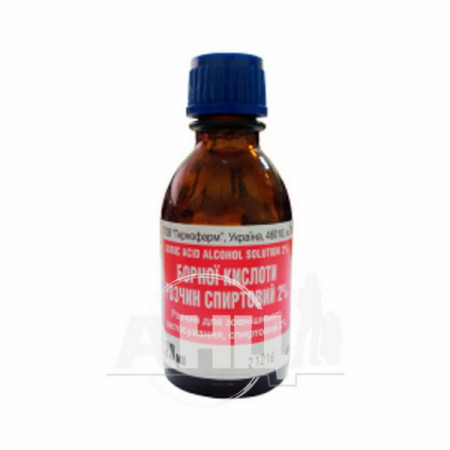Sanidar solution for external use 0.2mg/ml 200 ml

INSTRUCTION
for medical use of a medicinal product
Sanidar®
(Sanidar)
Composition:
active ingredient: decamethoxine;
1 ml of solution contains decamethoxine 0.2 mg;
Excipients: sodium chloride, water for injections.
Dosage form
Main physicochemical properties: clear colorless liquid.
Pharmacotherapeutic group
Pharmacological properties.
Pharmacodynamics.
Decamethoxine has an antimicrobial and antifungal effect, concentrates on the cytoplasmic membrane (CPM) of the microbial cell and combines with the phosphatide groups of membrane lipids, disrupting the permeability of the CPM of microorganisms. Decamethoxine has a pronounced bactericidal effect on staphylococci, streptococci, diphtheria bacillus, capsular bacteria and a fungicidal effect on yeast, yeast-like fungi, pathogens of epidermophytia, trichophytia, microsporia, erythrasma, some types of mold fungi (aspergillus, penicillin), a protistocidal effect on trichomonads, giardia, a virucidal effect on lipophilic viruses. Highly active against microorganisms resistant to antibiotics. Strains of microorganisms resistant to decamethoxine are formed slowly and in small quantities with prolonged use. Bacteriostatic (fungistatic) concentrations are similar to its bactericidal (fungicidal), virucidal, and protistocidal concentrations. During the use of the drug, the sensitivity of antibiotic-resistant microorganisms to antibiotics increases.
Pharmacokinetics.
The drug is practically not absorbed by mucous membranes, intact skin, and wound surfaces.
Clinical characteristics.
Indication
Use for the treatment of pustular bacterial and fungal skin diseases, microbial eczema, purulent-inflammatory lesions of soft tissues (abscesses, carbuncles, phlegmons, furuncles, purulent wounds, panaritium); dental diseases (stomatitis, ulcerative-necrotic gingivitis, dystrophic-inflammatory form of periodontitis of I–II degree in the acute stage).
The drug is also indicated for chronic tonsillitis, angina, carriage of staphylococci and diphtheria bacilli, ulcerative colitis, and paraproctitis.
In gynecological practice, it is used for the treatment of candidiasis of the vaginal mucosa, inflammatory diseases of the genitals of microbial origin, prenatal sanitation of the birth canal, and treatment of postpartum endometritis.
For the treatment of purulent-inflammatory diseases of the abdominal and pleural cavities.
For hygienic disinfection of the skin of the hands of medical personnel and rubber gloves during the examination of patients and the performance of medical manipulations and minor surgical interventions, pre-sterilization disinfection of medical instruments and diagnostic equipment made of metals, rubber, polymeric materials and glass.
Contraindication
Individual hypersensitivity to the components of the drug.
Interaction with other medicinal products and other types of interactions
Decamethoxine is a cationic surfactant, so it is incompatible with soap and other anionic compounds.
Decamethoxin increases the sensitivity of antibiotic-resistant microorganisms to antibiotics.
Application features
Decamethoxine in the concentration used in the drug does not have a toxic effect. Long-term use of the drug does not cause any toxic reactions. Heating the solution to 38 °C before use increases its effectiveness. In case of inflammation and skin irritation, dilute the drug with distilled water in a ratio of 1:1 or 1:2.
Use during pregnancy or breastfeeding.
Animal studies have shown embryotoxicity and teratogenic effects of decamethoxine. There are no adequate data on the safety of the drug for use in pregnant women. The drug should not be used during pregnancy, except in exceptional cases when the benefit to the mother outweighs the potential risk to the fetus.
The ability to influence the reaction speed when driving vehicles or other mechanisms.
There are no warnings regarding the impact on the reaction speed when driving or working with other mechanisms.
Method of administration and doses
When using the medicine, do not swallow the solution.
For purulent and fungal skin lesions, purulent wounds, the solution should be used in the form of washes, lotions. For the treatment of proctitis and ulcerative colitis, a warm solution should be administered in the form of enemas of 50–100 ml 2 times a day until the signs of acute inflammation disappear completely. Fistulas in chronic paraproctitis should be washed with the drug daily for 3–4 days. For washing the bladder in adult patients, a solution of decamethoxin should be used after prior dilution 1:7 with purified water in a dose of 500–600 ml (for a course of treatment of 7–20 washes).
Oral mucosal lesions should be treated by application of 25–50 ml for 10–15 minutes or rinsing (100–150 ml). Dystrophic-inflammatory form of periodontitis of I–II degree in the acute stage should be treated by irrigation of pathological periodontal pockets with a warm solution (50–70 ml) or applications to the gums until the inflammatory phenomena subside. Patients with candidal lesions of the oral mucosa, ulcerative-necrotic gingivitis should be prescribed oral rinsing (100–150 ml) 4 times a day for 5–10 days.
Sanitation of carriers of staphylococcus and diphtheria bacillus should be carried out by rinsing the throat with a solution, washing the lacunae, and irrigating the nasopharynx and tonsils. The lacunae should be washed 3–5 times every other day.
In the treatment of purulent-inflammatory diseases of the abdominal and pleural cavities, fill the affected area to the brim with the drug with an exposure of at least 10 minutes. If necessary, in particular when suturing "tightly" (without drainage), carry out multiple filling of the operating cavity with subsequent removal of the solution to clean washing waters. Flow-washing drainage of the cavity is performed using drains or by the puncture method.
For the treatment of microbial and fungal trichomonad lesions of the vaginal mucosa, the drug should be used in the form of douching (50–100 ml of a solution heated to 38 °C 3 times a day). In the same way, perform a one-time prenatal sanitation of the birth canal. Treatment of postpartum endometritis should be carried out by washing the uterine cavity with a warm drug (150–200 ml) 2 times a day.
Disinfection of the skin of hands and rubber gloves should be carried out by applying 5–10 ml of the drug to a previously washed surface to be disinfected for 5 minutes.
Disinfect cleaned medical instruments, mouthpieces, tubes, and equipment by immersing them in the solution for 30 minutes.
Children.
There is no experience with use in children.
Overdose
Due to the lack of absorption, overdose is unlikely.
Adverse reactions
In rare cases, some patients may have increased individual sensitivity. In such individuals, skin rashes, burning, dryness, itching and other local allergic reactions may occur after using the drug.
Reporting of suspected adverse reactions.
Reporting suspected adverse reactions after the marketing authorisation of a medicinal product is an important procedure. It allows for continued monitoring of the benefit-risk balance of the medicinal product in question. Healthcare professionals should report any suspected adverse reactions via the national reporting system.
Expiration date
Storage conditions
Store in the original packaging at a temperature not exceeding 25 ° C. Do not freeze.
Keep out of reach of children.
Packaging. 100 ml, 200 ml or 400 ml in bottles.
Release category: Over-the-counter.
Manufacturer: PrJSC "Pharmaceutical Company "Darnitsa".
Location of the manufacturer and address of its place of business.
Ukraine, 02093, Kyiv, Boryspilska St., 13.
There are no reviews for this product.
There are no reviews for this product, be the first to leave your review.
No questions about this product, be the first and ask your question.


